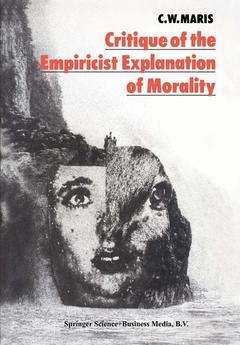Critique of the Empiricist Explanation of Morality, 1981 Is there a Natural Equivalent of Categorical Morality?
Langue : Anglais
Auteur : Maris C. W.

a. 'Two things fill the mind with ever new and increasing admiration and awe, the oftener and the more steadily we reflect on them: the starry heavens above and the moral law within. ' Thus Kant formulates his attitude to morality (Critique of Practical Reason, p. 260). He draws a sharp distinction between these two objects of admiration. The starry sky, he writes, represents my relationship to the natural, empirical world. Moral law, on the other hand, is of a completely different order. It ' . . . begins from my invisible self, my personality, and exhibits me in a world which has true infinity, but which is traceable only by the understanding and with which I discern that I am not in a merely contingent but in a universal and necessary connection (. . . ). ' (p. 260). So Kant sees morality as a separate metaphysical order opposed to the world of empirical phenomena. Human beings belong to both worlds. According to Kant, the personality derives nothing of value from its relationship with the empirical world. His part in the sensuous world of nature places man on a level with any animal which before long must give back to the rest of nature the substances of which it is made.
I: A topography of the empiricist theories of law.- II: Hobbes’s empiricist theory of morality.- III: The empiricist theories of David Hume and Adam Smith.- IV: Comte and positivism.- V: Herbert Spencer and evolutionism.- VI: Guyau’s philosophy of life.- VII: Durkheim’s sociological ethics.- VIII: Stevenson’s and Hare’s analysis of language.- IX: Scandinavian realism.- X: Scepticism or empiricism?.- XI: The problem of the empiricist explanation of normativity: is there a natural equivalent of ‘duty’?.- XII: The empiricist justification of the claims of morality.- XIII: The hierarchy argument as a justification of morality.- XIV: The congruency argument.- XV: The moral game.- XVI: Conclusion.- Index of Names.
Date de parution : 08-2014
Ouvrage de 475 p.
17x24.4 cm
Disponible chez l'éditeur (délai d'approvisionnement : 15 jours).
Prix indicatif 52,74 €
Ajouter au panierMots-clés :
David Hume; Kant; Moral Law; ethics; morality; positivism; realism
© 2024 LAVOISIER S.A.S.



